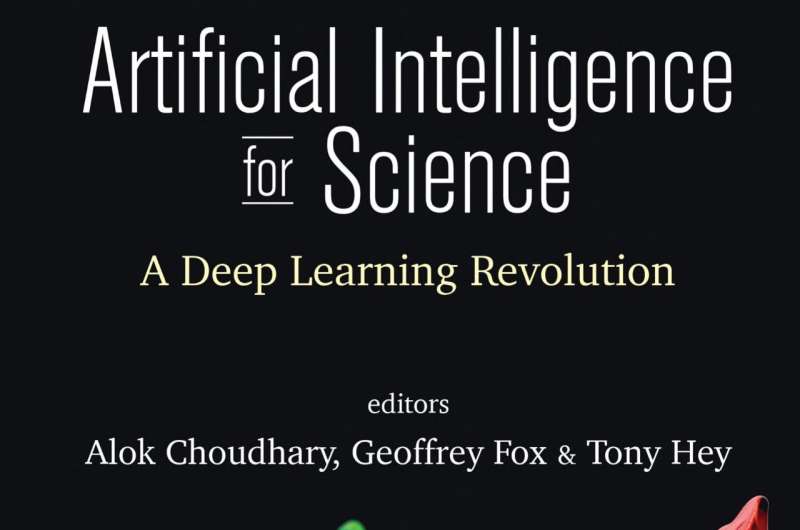This article has been reviewed according to Science X's editorial process and policies. Editors have highlighted the following attributes while ensuring the content's credibility:
fact-checked
trusted source
proofread
Artificial Intelligence to reshape deep science learning

Artificial Intelligence, beyond the hype and hysteria in headlines today, plays a growing role in daily life and business—with uses ranging from predictive text to Netflix recommendations to the detection of bank fraud.
Much of that progress is thanks to researchers on the cutting edge of complex scientific exploration.
And there is more to come.
At UC Riverside, a team of four scientists has laid out their vision for using machine learning to maintain, improve and design some of the most sophisticated scientific equipment on Earth.
"Using AI to tackle major scientific challenges not only has the potential to advance science, but also to trickle down to solving problems in everyday life," said Vagelis Papalexakis, associate professor of Computer Science and Engineering at UC Riverside. "GPS being a great example."
A chapter on the UCR team's vision was published in April 2023 by World Scientific in the book "Artificial Intelligence for Science: A Deep Learning Revolution."
Chapter 7, "Machine Learning for Complex Instrument Design and Optimization," explores how AI can refine, improve—even revolutionize—large-scale scientific experiments. The idea is to leverage machine learning to simulate, computationally, an immense range of possibilities for operations and design—not only saving time, money and resources through efficiencies and comprehensive improvements, but also exploring counterintuitive designs and ideas.
"That sounds futuristic—and that is the hope," Papalexakis said. "We are asking, "What is the promise of AI?'"
His co-authors are Barry C. Barish, Nobel Laureate, California Institute of Technology professor of Physics emeritus, and UCR distinguished professor of Physics and Astronomy; Jonathan Richardson, UCR assistant professor of Physics and Astronomy; and Rutuja Gurav, a Ph.D. candidate at UCR in computer science.
Their approach could enhance the design and operation of elaborate engineering, including the Laser Interferometer Gravitational-wave Observatory. LIGO, managed by Caltech, comprises two sets of two 2.5-mile-long laser beams, in Washington state and Louisiana, that detect gravitational waves from cosmic phenomena such as pairs of black holes merging that emit no light and thus can't be observed visually.
Gravitational waves help scientists understand the mysteries of space, the origins of the universe and fundamental laws of physics. LIGO itself has opened a new frontier in astronomy, with findings so groundbreaking that Barish, the former director of LIGO, shared the 2017 Nobel Prize in Physics.
"Advances in experimental physics rely on our ability to develop highly complex state-of-the-art instruments," Barish said. "Machine learning is playing a larger and larger role in the conception, design and the implementation of such advanced experimental facilities. It is fair to say that AI is becoming a full partner in making new discoveries in physics."
The new research envisioned would, for example, help scientists learn how to improve or even design end-to-end instruments in ways that improve their sensitivity and resilience to real-world sources of error, such as environmental noise.
"Instead of doing this in a lab, AI would do the heavy lifting of testing potential designs and finding one that works best" for LIGO's massive infrastructure, Papalexakis said. "It's a computational way of simulating things that will aid significantly in the design of large-scale experiments."
Such approaches would tap and adapt the technology that runs emerging public platforms such as ChatGPT and Bing AI, with large implications for scientific discovery and everyday innovation.
The scientists noted that using AI to test, model and improve large scientific systems would not displace researchers or engineers.
"Frontier experiments like LIGO are incredibly complex instruments, with dozens of interdependent control systems and thousands of data channels," Richardson said. "Our hope is that AI advances, such as those being pursued at UCR, will be able to recognize hidden associations in this sea of data that could diagnose operational problems. This, in turn, would inform new ways that we, as human physicists, can make physical changes that improve the performance of the detector."
The research grew from a student's fascination and a fortuitous meeting.
Gurav, a graduate student working in Papalexakis' computer science lab, brought a fascination with isolating gravitational waves from other noise. Then, a public lecture at UCR four years ago by gravitational-wave expert Barish led the group to meet, talk and collaborate on the project.
Gurav praised her UCR mentors and said, "It is wonderful to see our work included in such an amazingly diverse collection of ideas on applied AI for natural sciences. It marks a special milestone in my rather unconventional Ph.D. journey as an aspiring computer scientist who is deeply interested in exploring applications of machine learning to advance the frontiers of scientific discovery."
Now that the chapter has been published, Papalexakis said, "I feel proud and a little terrified." Publicly laying out research directions for complex scientific study brings "a sense of responsibility that we don't take lightly. But I'm excited that people believe these things are worth investigating."
More information: Alok Choudhary et al, Artificial Intelligence for Science (2023). DOI: 10.1142/13123

















